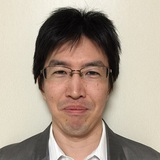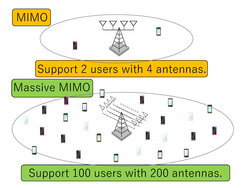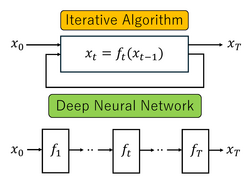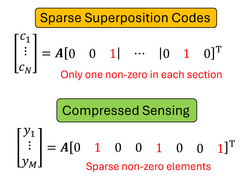
Takeuchi, Keigo
| Affiliation | Department of Electrical and Electronic Information Engineering |
|---|---|
| Title | Associate Professor |
| Fields of Research | Wireless communications / Information theory / Signal processing |
| Degree | Doctor of Informatics (Kyoto University) |
| Academic Societies | IEEE / IEICE / Physical Society of Japan |
| takeuchi@ee Please append ".tut.ac.jp" to the end of the address above. |
|
| Laboratory website URL | https://comm.ee.tut.ac.jp/csp/ |
| Researcher information URL(researchmap) | Researcher information |
Research
In future wireless communications, groundbreaking schemes are needed to satisfy high performance requirement. To realize such a paradigm shift in the field of communications, an interdisciplinary point of view is important in our research. One sometimes recognizes that a problem is essentially the same as a problem that has been already solved in another research field while there is no superficial relationship between the two problems. Our goal is to realize novel communication schemes by applying such achievements on the other fields to the field of communcations. Also, we are aiming to deliver our achievements on communications to different research fields in order to contribute to academic and industrial progress in wide fields including communications.
Theme1:Massive MIMO
Overview
Multiple-input multiple-output (MIMO) is a wireless communication system that uses multiple transmitting and receiving antennas for information transmission. In massive MIMO systems, base stations equip a large number of antennas to support many users simultaneously. Conventional receivers cannot be used to process all user signals jointly and efficiently. In our laboratory, we are aiming to construct efficient reception schemes for massive MIMO on the basis of iterative methods called message-passing proposed in the field of compressed sensing.
Selected publications and works
[5] K. Takeuchi, "Decentralized Generalized Approximate Message-Passing for Tree-Structured Networks," IEEE Trans. Inf. Theory, vol. 70, no. 10, pp. 7385-7409, Oct. 2024.
[4] K. Takeuchi, "Orthogonal Approximate Message-Passing for Spatially Coupled Linear Models," IEEE Trans. Inf. Theory, vol. 70, no. 1, pp. 594-631, Jan. 2024.
[3] K. Takeuchi, "On the Convergence of Orthogonal/Vector AMP: Long-Memory Message-Passing Strategy," IEEE Trans. Inf. Theory, vol. 68, no. 12, pp. 8121-8138, Dec. 2022.
[2] K. Takeuchi, “Bayes-Optimal Convolutional AMP,” IEEE Trans. Inf. Theory, vol. 67, no. 7, pp. 4405-4428, Jul. 2021.
[1] K. Takeuchi, "Rigorous Dynamics of Expectation-Propagation-Based Signal Recovery from Unitarily Invariant Measurements," IEEE Trans. Inf. Theory, vol. 66, no. 1, pp. 368-386, Jan. 2020.
Keywords
Theme2:Deep Learning
Overview
In conventional design procedure human researchers designed parameters in an algorithm by hand on the basis of numerical simulations. Since this design procedure requires a lot of time, a trial-and-error approach based on experience was used, such as a reduction in the number of design parameters and a restriction of the region of possible parameters. In our laboratory, we are aiming to construct a deep-learning method for artificial intelligence (AI) to design parameters in an iterative algorithm, by regarding the algorithm as a deep neural network with the same number of layers as the number of iterations in the algorithm.
Selected publications and works
[1] T. Yoshida and K. Takeuchi, "Deep Learning of Damped AMP Decoding Networks for Sparse Superposition Codes via Annealing," IEICE Trans. Fundamentals., vol. E106-A, no. 3, pp. 414-421, Mar. 2023.
Keywords
Theme3:Error-Correcting Codes
Overview
Error-correcting codes allow the receiver to correct errors due to noise in the channel, by adding redundant information to transmitted information in advance. In our laboratory, we focus on decoding schemes for error-correcting codes, called sparse superposition codes. A sparse superposition code is a low-complexity and capacity-achieving error-correcting code proposed by modifying theoretical random coding, which achieves the Shannon limit but is not realizable. We are aiming to construct message-passing decoding for sparse superposition codes, by focusing on the similarities between decoding for sparse superposition codes and signal reconstruction in compressed sensing.
Selected publications and works
[2] T. Yoshida and K. Takeuchi, "Deep Learning of Damped AMP Decoding Networks for Sparse Superposition Codes via Annealing," IEICE Trans. Fundamentals., vol. E106-A, no. 3, pp. 414-421, Mar. 2023.
[1] H. Mayumi and K. Takeuchi, "Expectation Propagation Decoding for Sparse Superposition Codes," IEICE Trans. Fundamentals., vol. E103-A, no. 12, pp. 1666-1669, Dec. 2020.
Keywords
Title of class
Introduction to Communication Engineering / Probability and Statistics / Signal Processing / Information and Communication Systems 2
Others (Awards, Committees, Board members)
(Awards)
Oct. 2021 35th Conf. Neural Inf. Process. Syst. (NeurIPS 2021) Outstanding Reviewers
Dec. 2017 IEEE Nagoya Section Young Researcher Award
Feb. 2016 2016 Exemplary Reviewers of IEEE Trans. Commun.
Feb. 2009 IEEE Kansai Section Student Paper Award




